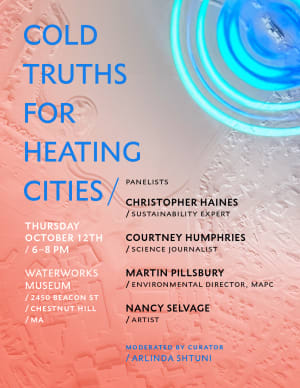Cold Truths for Heating Cities: A Panel Discussion
Thursday, Oct 12, 2023 6:00p -
8:00p
Where:
Metropolitan Waterworks Museum
2450 Beacon St.
Boston, MA 02467
Admission:
FREE
Categories:
Art, Lectures & Conferences, Social Good
Event website:
https://lnkd.in/eb2udgqC
To mark the 175th anniversary of Boston’s first municipal water supply, we invite you to a multidisciplinary panel discussion about our relationship with water in the times of climate crisis. This event is part of the programming for the exhibit “Reservoir: What the Water Knows” curated by Arlinda Shtuni.
Water and its cycles are at the heart of climate warming, and cities are the pressure points in this fragile ecosystem. As urban dwellers, we have an abstract connection with water, as invisible infrastructures and complex systems deliver it to us. And we take for granted that this system will function, until it is disrupted by droughts and floods. Our dependence on water has shaped our urban environments. Yet, as water cycles change and cities become heat islands, how can we creatively and sustainably respond and adapt to our changing environment?
A multidisciplinary panel featuring an urbanist, a science writer, a sustainability expert, and a public artist will offer perspectives on how to become more weather responsive and resilient. They will exchange views on how reframing our view of cities as integral to nature can impact our response to the impending environmental threat.
Panelists
Christopher A. Haines, AIA, NCARB, is a Principal at Permadigms. His architecture career has spanned energy efficiency, preservation, building science, and regenerative design. He has taught undergraduate and graduate classes on architectural technology, environmental management, and urban sustainability and published pieces on degrowth economics, urbanism, and the impacts of the human brain. His involvement with Biodiversity for a Livable Climate, turned his attention to the intersection of climate, biodiversity and the built environment. His epiphany “where does the heat come from?” instigated writing a book on this hopeful climate paradigm. His peer-reviewed article, “Greenhouse Gases: True but Not the Whole Truth,” is available online.
Courtney Humphries is a writer and interdisciplinary researcher in urban environmental governance, infrastructure history, and climate change adaptation. She is a Visiting Assistant Professor in environmental studies and Core Fellow at Boston College. She holds her PhD in environmental sciences from UMass Boston, was a Knight Science Journalism Fellow at MIT in 2015-2016 and a Public Research Fellow at the Norman P. Leventhal Map and Education Center at the Boston Public Library in 2020-2021. Her writing has appeared in the Boston Globe, MIT Technology Review, Nautilus, Politico, CityLab, New Scientist, Nature, Science, Wired, The Atlantic, Harvard Magazine, Architect, and other publications.
Martin Pillsbury, Environmental Director at MAPC (Metropolitan Area Planning Council). He manages all aspects of the agency’s environmental and water resources programs. He currently oversees MAPC’s climate adaptation planning, the Hazard Mitigation planning program, and the agency’s technical assistance on stormwater management, including MS4 permits, Low Impact Development, and Green Infrastructure. He participates in state water resources policy as a gubernatorial appointee to the Water Management Advisory Committee, and he recently served as an appointee to the legislative Water Infrastructure Finance Commission. At the local level, Mr. Pillsbury has extensive experience in preparing groundwater and aquifer protection plans for dozens of communities across the MAPC region. He has also assisted the MA Department of Environmental Protection in drafting the state’s Model Groundwater Protection Bylaw and has managed several projects to help communities develop stormwater management bylaws as well as a stormwater enterprise fund.
Artist Nancy Selvage, whose artworks appear in the exhibit “Reservoir: What the Water Knows,” grapples with how to express our collective anxiety over accelerating climate change by exploring the impact of weather on one’s psyche. She responds to the ever present threat of dire climate change by reducing her carbon footprint, giving presentations on the sustainability of various art practices, advocating for local green energy initiatives, and by embedding her concerns in the creation of sculpture.
The event is free and open to all. We gratefully accept donations of $10. Help us monitor capacity by reserving your ticket in advance.
-

SponsoredApply to be a mentor at Silver Lining Mentoring
Saturday, Apr 19, 2025 goes until 06/30
Silver Lining Mentoring
-

SponsoredHannah Selinger + Kara Baskin at the BPL
Wednesday, Apr 30, 2025 6:00p
The Boston Public Library, Central Library Copley Square, Commonwealth Salon
-

Sponsored -

Sponsored -

Sponsored -

SponsoredJuegos de Palabras: Spanish game night at BASE
Tuesday, Apr 22, 2025 6:00p
Boston Area Spanish Exchange (BASE)
-

SponsoredThe Plugged In Band at the JFK Library (Free)
Tuesday, Apr 22, 2025 10:30a
John F. Kennedy Presidential Library and Museum

